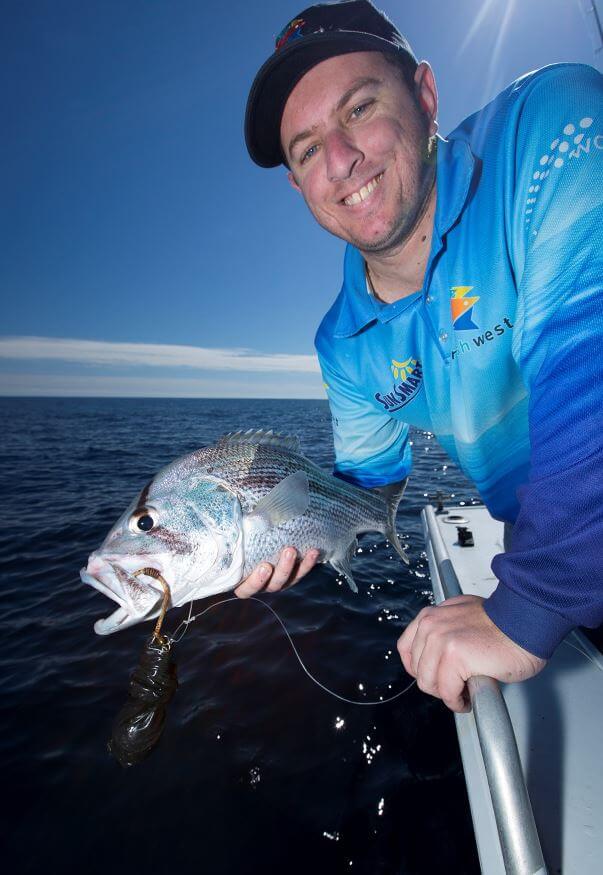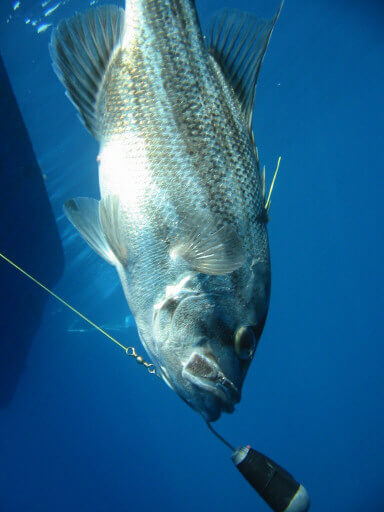The west coast demersal closure ends today with dhuies, pinkies and baldies all back on the Chrissie lunch menu from tomorrow, 16 December.
Although it’s great these iconic species can be pursued again, west coast demersal stocks remain under recovery and Recfishwest urges good stewardship through fishing practices which minimise impact of fish dying post-release to protect this highly valued resource.

This means using release weights to release undersize fish and fishing for other species such as pelagics and squid once you’ve reached your bag limit for demersals.
Ensuring demersal stocks continue to recover
For the past two months, recfishers within the West Coast Bioregion – stretching from north of Kalbarri to east of Augusta – have kept their lines away from demersal fish.
The closure is part of the West Coast demersal stocks’ ongoing recovery, which has been underway for more than a decade, with recfishers continuing to play a critical role in achieving a 50 per cent reduction in the catch from 2005/06 to recover stocks of these slow-growing species within a 20-year timeframe.
Although halfway through the recovery plan, studies by the Department of Primary Industries and Regional Development (DPIRD) show good signs of recovery, especially in the South West.
However, Recfishwest CEO Dr Andrew Rowland said there was still a way to go.
“Recfishers must continue to spearhead the recovery of west coast demersal stocks through doing their bit to look after the resource,” he said.
“We all want to get our dhuie fillets for the festive period, but if an undersized fish needs to be released, we must take added care to give the fish the best chance of survival. That means handling fish carefully and using a release weight.
“Let’s also be clear, catch and release fishing for demersals is not OK – post-release mortality – fish dying after release – can be a significant factor in the rate of the stocks’ recovery. So, once you have enough demersals for a feed, stop fishing for them.
“That certainly doesn’t have to be the end of your day’s fishing either – change it up – troll for some pelagics, have a go for some squid, crabs or whiting.”
Beating barotrauma
Many demersal fish suffer mortality from barotrauma, especially when caught at depths of 30m or more.
Barotrauma is caused by the expansion of gases in the swim bladder and other organs when a fish does not have time to adjust to changing water pressure while they are being pulled to the surface.
Visible signs include an inflated abdomen, bulging eyes or stomach protruding from the fish’s mouth. Barotrauma can be lethal to a fish, but you can play your part in minimising its impacts on a fish.

Releasing demersal fish safely
To give an undersized or unwanted fish experiencing barotrauma the best chance of survival, a release weight should be used. Fishing rules require you to have a release weight on board if fishing from a boat for demersals in the West Coast Bioregion.
The effective and easy-to-use device, which is essentially a heavy-weighted barbless hook with a loop at the top to attach a retrieval line, allows for a fish with barotrauma to recompress.
The release weight has been scientifically proven to increase the chances of demersal fishes’ post-release survival.
Click here for more info about using a release weight effectively!
Donate your fish skeletons for science
Fisheries scientists continue to need plenty of samples of fish to monitor the recovery of west coast demersal fish stocks. Recfishers can help on this front by donating their fish frames (skeletons with the heads and guts intact) to DPIRD’s Send Us Your Skeletons program.
The key parts used for ageing the fish – the otoliths or the fishes’ earbones – are found in the fishes’ heads and the Department now takes west coast demersals’ heads as part of the Send Us Your Skeletons program, so fishers can keep the frames for the barbie or burley if they wish.
The cheeks and the wings are not required for research purposes either so these can also be kept by fishers donating frames and heads.
As well as helping with the ongoing recovery of the west coast demersal fish stocks, fishers who donate their frames will also go into an annual prize draw for a charter trip to the amazing Montebello Islands courtesy of Montebello Island Safaris.
Find out more about DPIRD’s Send Us Your Skeletons Program here
“It’s really important recfishers are seen to be playing their part in the recovery of these highly valued fish,” Dr Rowland said.
“We hope you get to bag a demersal or two for Christmas – but let’s continue to work together to ensure the recovery continues to progress and that there will be plenty of these fantastic fish to go at for us and for future generations of West Aussie fishers.”






